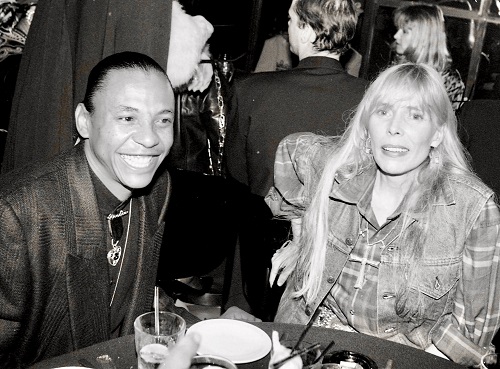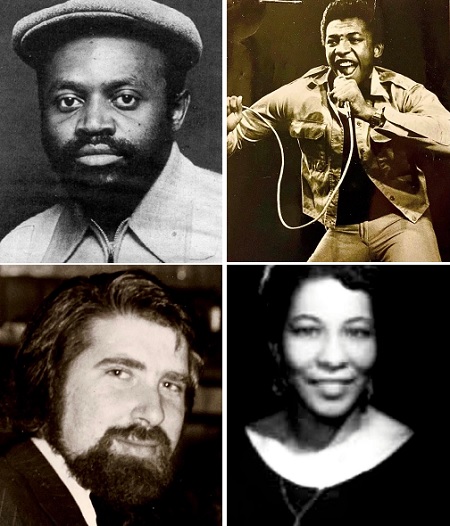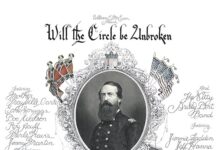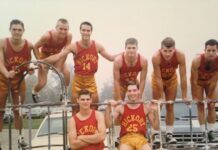Photos courtesy of Charles Valentino and Chris Spierer
It took four individuals to propel the first — and, to date, most impactful — gay anthem into public consciousness.
Direct in its approach yet wholly accessible and embracing of humanity in its content, “I Was Born This Way” breaks down an individual’s journey of self-discovery, self-acceptance, and plea for universal love. It’s designed to hit our hearts and get us realizing that it’s wrong to stigmatize others, especially when it comes to their sexuality.
This is exemplified in one of the most pivotal lyrics ever written: “I’m happy, I’m carefree, and I’m gay! Tain’t a fault, tis a fact, I was born this way!”
Released in 1975, the jubilant track — complete with gospel sound and feel — was sung by 23-year-old Charles Valentino Harris, Jr., known at the time as “Valentino.” The song’s journey would extend from Harlem, to New York City proper, to Motown, to worldwide covers, to ultimately a modernized rendition from one Lady Gaga (“Born This Way”), who would unabashedly tell the world about “I Was Born This Way” and how it influenced her own track.
“We wrote the song for the gay community. The most important thing is it was more than just a song. It made history,” says the song’s co-writer Chris Spierer. “That song was required reading in many colleges for tests — they would want people to know what the song meant to them.”
The track began as the brainchild of Bunny Jones, a music manager and beauty salon proprietor in Harlem. Inspired by the tales of gay discrimination her clientele and friends would share, Jones, a straight woman, documented both her frustration and hope for change onto paper. Her lyrics would defy tradition and tell it like it was at the time. Here, Jones is showcasing how all people are one in the same — don’t persecute and harm one another just because they believe something you don’t understand:
“I’m walking through life in nature’s disguise. You laugh at me and you criticize…”
“Now I won’t judge you and don’t you judge me. We’re all the way nature intended us to be.”
Valentino, then performing in a production of Hair on Long Island, was picked personally by Jones to be the lead voice for her track. She would also become his manager for a time.
“She wanted it be an anthem,” Valentino, now 70, told me recently. “The song never got sexual. It was always supposed to be a high song that made people feel good. (Bunny) said she looked up the word ‘gay’ in the dictionary and what she found was ‘joyous, light, and lively.’ And she said that fit me perfectly.”
Turning its back fully on the notion of “taboo,” the song is arguably the first to directly use the word “gay” in terms of sexuality. The track was recorded and released three years before the commercial arrival of artists and bands like Sylvester and the Village People (and really the dominance of the disco era). Remember, Studio 54 didn’t become Studio 54 until 1977. It would be even longer before acts like Bronski Beat (“Smalltown Boy”) and Erasure (“Chains of Love”) released seminal tracks that transposed
the gay experience onto hit records. Rod Stewart would chronicle the life of a gay protagonist on 1976’s “The Killing of Georgie (Part I and II)” but its lyrics depict an inevitable tragedy, not a culture of acceptance.
“I Was Born This Way” is also unique in that it arrives mere months after Bruce Wayne Campbell, aka Jobriath, stepped away from the music industry. Jobriath, who died in 1983, was the first openly gay rock musician signed to a major record label.
“When the Village People came out, it was obvious, but they didn’t mention it. This song mentioned it,”
Spierer adds. “Valentino just came right out of the closet and said, ‘I’m gay and I’m happy and proud to be that way.’ This was a direct message to the community, and it really clicked. It did very well.”
According to Spierer, the entire song, once music was introduced into the mix, was completed “in 10 minutes.” A single recording session of approximately three hours yielded the Valentino version of “I Was Born This Way.” Playing drums on the track would be Stevie Wonder, fresh off the success of his Grammy Award-winning Innervisions and Fulfillingness First Finale albums.
“Bunny and Stevie had a little run-in because he wanted to change everything about the song. He had an idea musically, but Bunny was like, ‘No, you’re not touching my song because I know if you decide to do this song it’s going to take you five years before we hear it again,’” Valentino recalls. “That’s exactly what she told him. So we went with the way she wanted it to go which is the way you hear it. It took on a life of its own.”
“Watching it all come together was really amazing,” he adds. Despite going on to Broadway, becoming a television actor, and working closely with celebrated music icons like Joni Mitchell, “I Was Born This Way” remains Valentino’s lone solo single to this day.
Jones would press the record under the banner of Gaiee Records, with stronger distribution ultimately coming from Berry Gordy’s Motown label.
“We started selling the song out of the trunk of our cars and to distributors as well. We sold 15,000 of them,” Spierer said. “Then she handed the record to a very prominent DJ at [WBLS at] that time, Frankie Crocker in New York. Frankie fell in love with the song and he played it. Approximately one week later it was number one. The song just took off.”
“I didn’t have any hang-ups about what was going to happen. I was just so free about it. The song was not a flimsy song which is why I loved doing it,” Valentino adds. “Here’s a kicker — when the song came out, all of my straight friends loved it. Every one of my straight friends would come and say, ‘Man, that’s really hot!’ Now I had some ‘ugh’ from the gay community, which is interesting, isn’t it? The straight guys were like, ‘Oh man, this is fucking great’ and I think it’s because of the fact I actually said (the word ‘gay’). It’s like, ‘You fucking said it dude. You didn’t beat around the bush.’ There’s an honesty about it the guys like.”
The song’s second life would take place two years later in 1977 when an openly gay Los Angeles musician, formerly hailing from the streets of New York City and Baltimore named Carl Bean receives a phone call from Motown Records about an opportunity to record the track. Per label head Berry Gordy: “It’s a message song with a gospel feel. Bean will tear it up.”
“I couldn’t quite believe it. It was as though the writer had read my very own heart,” Bean writes in his autobiography, I Was Born This Way.
Doubling in length from Valentino’s version, Bean’s “I Was Born This Way” is essentially full-on disco but with a Teddy Pendergrass-style preaching that elevates the track to Marvin Gaye/“What’s Going On” social consciousness. Adding lyrical flourishes of “I feel good,” “If I were you, I’d sit down and consider what you’re doing,” and “Love me like I love you,” Bean is at the pulpit, pouring out his heart and soul, finding catharsis in his own lifetime of experience and realization of his self-identity. When Bean exclaims, “I’m proud to tell you,” you can all but taste his courage. It doesn’t matter that the song was written years beforehand; what matters is how many can relate to both its message and mindset.
“I loved Carl. I loved that version. Carl’s version is more of a dance version,” Valentino says. “My version is really hard to dance to. It was written as an anthem.”
“When Carl sang, he always sounded like he was preaching, no matter which song he sang,” Spierer adds. “They are two different beats, two different feelings but they both work, and they are both perfect for the times they were recorded.
Bean, who passed away last year at age 77, would achieve fame in a more humanitarian manner, becoming the founder of the Unity Fellowship Church in Los Angeles. He would also become a noted AIDS activist post his “I Was Born This Way” success.
“Carl Bean was a dear friend of mine. He was revered. He had a church. He helped people with AIDS; he took them in. I mean this man was a hero,” Spierer said. “I’m so happy that he heard what Lady Gaga said before he passed away. He was a great man.”
Today the song lives on worldwide as artists across multiple genres and regions (the UK and Sweden included) spread its message far and wide. When we think now of the influence of Lin-Manuel Miranda’s seminal “Love is love” mantra, take a moment to also reflect on just how influential this musical game-changer truly is.
“The message is stronger than the song itself. The message is what we wanted to get out and the music helps elevate the message to make people listen,” Spierer says. “That was the whole idea we had right from the very beginning. It worked out really well.”
“I Was Born This Way”
Words: Bunny Jones
Music: Chris Spierer
I’m walking through life in nature’s disguise
You laugh at me, and you criticize
Just because I’m happy
I’m carefree
And I’m gay
Yes, I’m gay
Tain’t a fault, tis a fact
I was born this way
You call me strange cause you don’t understand
God’s role for me in life’s overall plan
Oh yes, I’m happy
I’m carefree
And I’m gay
Yes, I’m gay
Tain’t a fault, tis a fact
I was born this way
Now I won’t judge you and don’t you judge me
We’re all the way nature meant us to be
Just human beings — born to be free
I can’t be you and you can’t be me
Taint a fault, tis a fact
Taint a fault, tis a fact
I was born this way
I’ve learned to hold my head up high
Not in scorn nor disgrace
Doing my thing individually
Entwined with the human race
Grooving in time — playing in space
Oh yes, I’m happy
I’m carefree
And I’m gay
Yes, I’m gay
Tain’t a fault, tis a fact
Yes, I was born this way
So be happy
Be carefree
Yeah, ain’t nothing wrong with being a little gay
Tain’t a fault, tis a fact
I was really really born this way
I’m happy
I’m carefree
Yeah, I’m gay

***
Share your feedback and suggestions for future columns with Ira at vinylconfessions84@gmail.com. Ira’s new book, “Hello, Honey, It’s Me”: The Story of Harry Chapin, is available for purchase here.




















